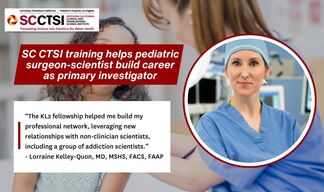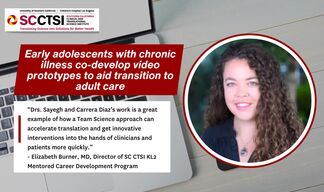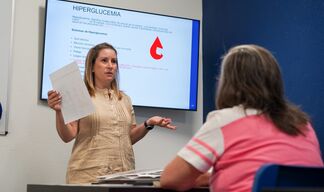Interview with Bridgid Mariko Conn, PhD, ABPP, KL2 award recipient
An interview with a recipient of the SC CTSI Mentored Career Development in Clinical and Translational Science award.
We sat down with Dr. Bridgid Conn, a recipient of the SC CTSI Mentored Career Development in Clinical and Translational Science award, to hear about her experience as a KL2 scholar and how she has furthered her professional goals. We look forward to seeing all she will accomplish in the coming years.
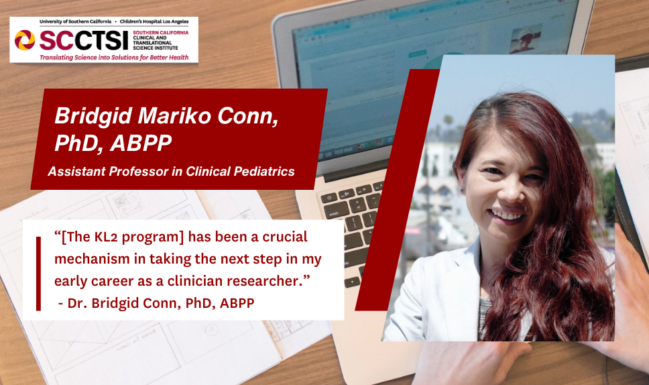
Tell us a little bit about your experience so far in the KL2 program.
It’s definitely been a whirlwind since starting the program last year. It’s pushed me to immerse myself more fully into the process of learning the nuances of clinical and translational research while attempting to apply some of the key principles and practices in real-time through my research. It has jump started a lot of new ideas and collaborations and provided the tools to accelerate my progress towards becoming an independent clinical researcher.
How did you first learn about the program?
I heard about this program from a colleague who was participating as a scholar.
What initially got you interested in starting this program?
I was looking for a training program to help me successfully transition to an independent career in a new area of research. The type of training and support offered seemed to match what I needed in order to make this pivot and also learn the new skills and tools needed to be competitive for an R-series clinical trial grant.
Tell us about your own background as a researcher and Pediatrics/Licensed Psychologist.
I am a board-certified child and adolescent psychologist with research training in developmental psychopathology, community-partnered approaches, and mixed-methodology, whereby I pair and use the strengths of both quantitative and qualitative research methods. My graduate and early career efforts have focused on understanding and addressing mental health disparities among historically marginalized, minoritized, and oppressed communities. I aim to utilize my experiences as a clinician to identify and support the unique mental health needs of BIPOC youth and transgender and gender-diverse youth.
What drove you to specialize in this?
I had many experiences at my first job as a case manager, where I saw the ways in which mental health systems lacked culturally sensitive care. I also felt ill-equipped to provide the best support. To that end, I sought out additional education and training to better understand the myriad socio-ecological factors, including chronic and complex trauma, that impact mental health outcomes for youth. My experiences in graduate school also drove me to seek out pathways to partner with youth and develop more culturally responsive interventions.
What do you think that others can gain from this program?
I think this program is well-suited for someone looking to kick start their career in clinical and translational research, and who has their divisional support to fully immerse themselves in this intensive research training opportunity. Through the KL2 program, researchers gain knowledge on a wide-range of topics related to the field of clinical and translational research. They also have the opportunity to network and practice crucial research skills, such as giving an elevator pitch, developing a statistical analysis plan, and engaging in team science.
Have you run into any challenges or obstacles along the way?
There are obstacles in any research endeavor; some are reflective of more administrative or logistical barriers associated with any funding mechanism, and some are related to unexpected outcomes like difficulties with recruiting, low statistical power, lack of analytic support, or balancing time management with clinical responsibilities. The Quality by Design Studio at the beginning of the program aims to help with early troubleshooting around potential barriers, but there are always unexpected challenges.
What has been the most rewarding part of being in the KL2 program?
The most rewarding aspect of the program thus far has been identifying the next steps in my research program through engaging in dialogue with researchers from other disciplines and formulating novel and innovative research ideas together. This effort also includes discussions about real-world implications and dissemination to communities who could most benefit from our research. The second more rewarding aspect has been seeing a research idea begin to take shape and become fully actualized in the form of conference presentations and publications.
What does the KL2 program mean to you and how has it furthered your career?
It has been a crucial mechanism in taking the next step in my early career as a clinician-researcher. It has definitely supported my acceleration into an independent research career and provided me the necessary tools and knowledge to successfully transition into a new career role.
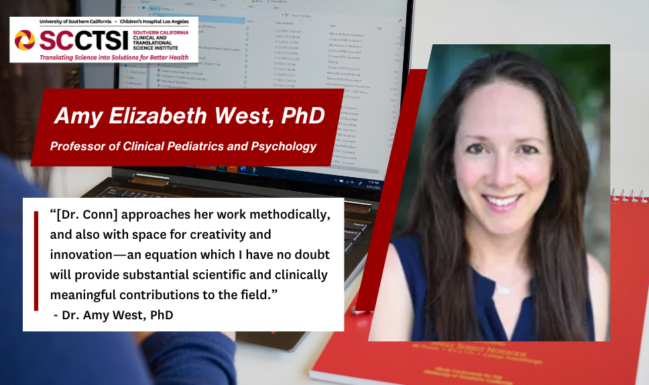
Who else has been an integral part of your success in this program?
I am grateful to have a very supportive and successful mentorship team who have been tirelessly dedicated to helping me progress with my research project, apply for additional training opportunities, and thoughtfully consider the next steps in my clinical research career. My application for this program, and indeed my progress in my research, would not be possible without their support.
Dr. Amy West is Dr. Conn’s mentor. We asked Dr. West, what has been your experience as a mentor to Dr. Conn?
Dr. Conn has been an absolute pleasure to mentor. She comes to this work with a rare blend of clinical expertise, research savviness, and a clear passion for improving the quality of life for this uniquely at-risk population. Dr. Conn approaches her work methodically, and also with space for creativity and innovation—an equation which I have no doubt will provide substantial scientific and clinically meaningful contributions to the field. I am just happy to be along for the ride, and cannot wait to see where Dr. Conn takes her career!
Are you ready to take the next step in your research career? Applications for the KL2 program are NOW OPEN and due 08/31/2024.
